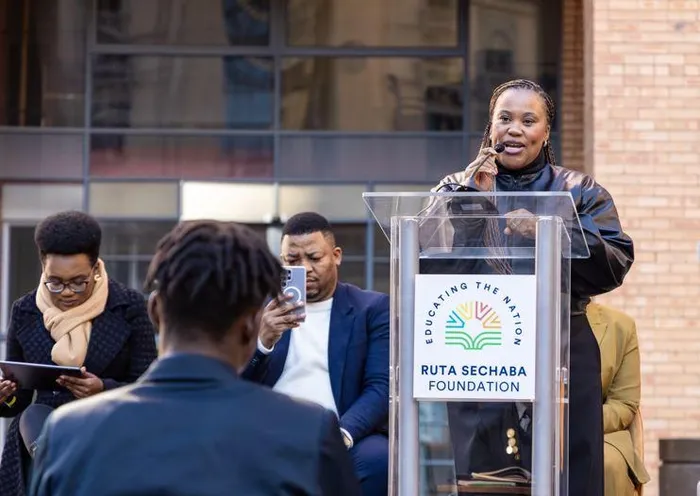Classroom to world-class: how companies can rewrite SA’s future

Natasha Mkhize is Executive: Strategic Relations at the Ruta Sechaba Foundation.
Image: Supplied.
Investing in education doesn’t just help an individual; it has a ripple effect that benefits their families, communities, and ultimately, the economy.
This simple truth, often referred to as the human capital theory, underscores the profound impact that education can have on society’s prosperity.South Africa has made notable strides in its commitment to education.
Between 2008 and 2023, our nation increased its education spending by 39% – a figure that surpasses the benchmark recommended by UNESCO.
While we celebrate these achievements, we also recognise that continued innovation and partnership are key to ensuring every learner gains the full benefit of these investments.
Recent insights remind us that there is always room to nurture and improve. A study released by the World Bank in February highlighted an opportunity to further support early reading skills among Grade 4 learners.
By emphasising enhanced teaching methods and well-coordinated reading programmes, there lies great potential for fruitful collaboration between the public and private sectors, especially in extending quality education to all learners, including those from lower-income families.
Since 2016, the Ruta Sechaba (Sesotho for ‘educating the nation’) Foundation has demonstrated the value of this approach with its support for learners from low-income households.
More than 3 000 young people – selected for their academic and sporting excellence, leadership potential and commitment to making a difference in their communities – have been awarded scholarships at Curro schools, and the outcomes have been overwhelmingly positive.
In 2024, every Grade 12 learner passed matric and 94% achieved a university exemption.
Two Ruta Sechaba scholarship recipients were among Curro’s top 10 performers nationally.
But it is in individual achievements that we really begin to understand the possibilities of investing in potential:
- Bayanda Walaza, a Grade 12 learner last year at Curro Hazeldean in Pretoria, warmed up for his matric exams by winning an Olympic silver medal as a member of South Africa’s 4x100m relay team in Paris last August. And on 24 May he was faster than ever, running a personal best of 9.94 sec that made him the world’s fastest under-20 so far this year.
- Dash Gilbert, who matriculated at Curro Durbanville in 2022, dreams of being the next South African to design championship-winning Formula 1 cars. He is studying motorsport engineering and leads the motor-racing fluid dynamics team at Oxford Brookes University in the UK.
- And Phoebe Mgxaji, who shone as a scientist and head girl at Curro Somerset West – she represented South Africa at the Beijing Youth Science Creation Competition in 2019 – was one of South Africa’s ‘voices of power’ in the recent Vroustemme concert in Cape Town. She is studying for a Bachelor of Music degree at Wits University.
This month, Bayanda, Dash and Phoebe will be among Ruta Sechaba alumni ‘back at school’, this time at Nelson Mandela Square in Sandton.
The foundation is setting up an outdoor classroom where a book on each desk tells the story of a world-class learner supported by the foundation.One desk, however, will convey a different narrative.
It will be empty, telling the story of an exceptional learner whose potential is yet to be unlocked; a story of an already-stretched education system that will have to accommodate an additional 1.2 million learners by 2030; and a story in which hundreds of thousands of bright young individuals and an entire economy are being let down by their schooling.
The subplots of this story are distressingly familiar: unemployment and crime.
Several studies have found that the education system produces graduates who often cannot meet basic literacy and numeracy requirements for available jobs, even at entry levels.
And because gaps in education limit legitimate earning opportunities, criminal activity becomes relatively more attractive.
Economists say there are correlations between areas with lower educational attainment and higher rates of property crime.
This is a story that can be rewritten, of course, which is what the foundation’s ‘world-class’ campaign this Youth Month sets out to do.
We are urging companies throughout the country to emulate the likes of PSG, Absa, Capitec and Exxaro in sponsoring bright young learners who need nothing more than the chance to show what they can become.
Put differently, we are asking them to invest in the future of South Africa, as shown by a recent North-West University study which analysed 26 years of data and concluded: ‘People who completed their Grade 12 (with matric certificate) and bachelor’s degrees contribute positively to South African economic growth.’
This is a scalable proposition. If each of the 270 JSE-listed companies sponsors 100 learners annually, within five years there will be 13 ,000 new reasons to believe in South Africa’s future.
If unlisted companies join them, the impact becomes exponentially greater – and so does the payback.
The skills base in the economy improves; positive brand associations make it easier to attract top talent; educated consumers with higher earning potential expand markets; companies benefit from operating in more stable, prosperous communities; and the risks associated with inequality and social instability recede.Help us to fill that empty desk this Youth Month.
Help bright young minds go from the classroom to world-class.
Natasha Mkhize is Executive: Strategic Relations at the Ruta Sechaba Foundation.
BUSINESS REPORT
Visit: www.businessreport.co.za